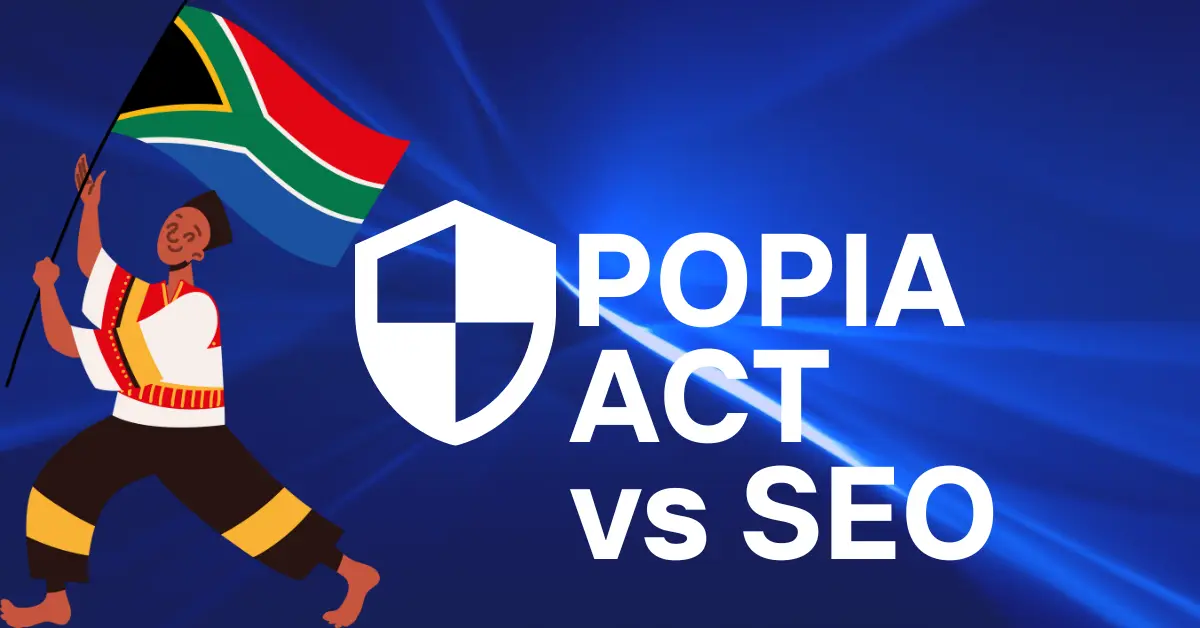Introduction
The Protection of Personal Information Act (POPIA), commonly referred to as the POPI Act, has become an important framework for businesses operating in South Africa. This legislation regulates how personal information is collected, processed, stored, and shared, aiming to protect individuals’ privacy and ensure responsible data practices.
For businesses with a digital presence, including SEO professionals and digital marketers, compliance with the POPI Act is not optional—it’s a legal requirement. But how does this affect your search engine optimization (SEO) efforts?
In this article, we will explore the intersection of the POPI Act and SEO in South Africa. We’ll unpack the implications of the legislation, share actionable strategies for compliance, and demonstrate how aligning with the POPI Act can improve your website’s trust and rankings..
What is the POPI Act?
The POPI Act is South Africa’s comprehensive data protection law, modeled after global privacy standards like the GDPR (General Data Protection Regulation). It ensures that businesses collect and process personal information in a lawful, fair, and transparent manner. Here are some of the key principles:
- Consent: Businesses must obtain clear consent from users before collecting or processing personal data.
- Purpose Specification: Data must be collected for specific, legitimate purposes.
- Accountability: Organizations are responsible for ensuring compliance.
- Security Safeguards: Businesses must protect data against unauthorized access, loss, or destruction.
Non-compliance can lead to significant penalties, including fines of up to R10 million or imprisonment for serious violations.
How the POPI Act Affects Data Collection for SEO
Data collection is important to SEO, from tracking website traffic to analyzing user behaviour. However, the POPI Act imposes strict guidelines on gathering and using data. Key areas impacted include:
User Consent
Websites must now implement clear, user-friendly cookie consent banners. These banners should inform users about what data is being collected, why it’s needed, and provide an option to accept or decline.
Implementation Tips:
- Use a cookie management tool like Cookiebot or OneTrust.
- Customize banners to include essential information without overwhelming users.
Analytics Tools
Popular tools like Google Analytics must be configured to comply with POPIA. This includes anonymizing IP addresses and ensuring user data is stored securely.
Implementation Tips:
- Enable IP anonymization in Google Analytics.
- Provide users with the option to opt out of tracking.
Impact on Local SEO
Local SEO focuses on improving a business’s visibility for location-based searches, such as “coffee shop near me.” The POPI Act affects how businesses manage local SEO efforts, particularly for Google My Business (GMB) profiles.
Transparency in Listings
GMB profiles should reflect accurate and transparent information, especially regarding how customer data (e.g., reviews or inquiries) is handled.
Implementation Tips:
- Include a link to your privacy policy in the GMB profile.
- Respond to reviews without revealing sensitive customer details.
Importance of Updating Privacy Policies for SEO
Privacy policies are essential for legal compliance and building trust with users. They also indirectly impact SEO by improving user engagement and reducing bounce rates.
Best Practices:
- Clearly outline how personal data is collected, stored, and used.
- Keep the language simple and avoid legal jargon.
Balancing User Experience and Compliance
While compliance is non-negotiable, businesses must avoid compromising user experience (UX). Overly intrusive pop-ups or lengthy consent forms can frustrate users, leading to higher bounce rates and lower rankings.
Tips for Balancing UX and Compliance:
- Use non-intrusive banners that don’t obstruct key content.
- Optimize website speed, even with added compliance features.
.
Keyword Research and POPI Act Compliance
Keyword research involves identifying search terms that resonate with your target audience. However, compliance requires avoiding keywords that could lead to sensitive or intrusive targeting.
Best Practices:
- Focus on generic, high-intent keywords that don’t rely on personal data.
- Avoid creating content that implies knowledge of sensitive user details.
Example: A healthcare provider targeted keywords like “health tips” instead of “personal health problems” to maintain compliance.
Building Trust Signals Through Compliance
Search engines prioritize websites that demonstrate trustworthiness. Compliance with the POPI Act can serve as a trust signal for users and search engines.
How to Build Trust:
- Display privacy certifications and compliance badges on your site.
- Regularly update your privacy practices and communicate changes to users.
Example: An online retailer displayed a “POPIA Compliant” badge, boosting user confidence and increasing conversion rates.
Analytics Tools and Compliance
Analytics tools are invaluable for SEO, but their usage must align with POPIA. Businesses must ensure transparency and security when using these tools.
Recommended Practices:
- Use first-party analytics tools where possible.
- Regularly audit your analytics settings to ensure compliance.
Practical Tips for SEO Professionals in South Africa
Here is a quick checklist to help SEO professionals align their strategies with the POPI Act:
- Review Privacy Policies: Ensure they are detailed, clear, and POPIA-compliant.
- Implement Cookie Banners: Use tools to create compliant banners.
- Audit Tracking Tools: Configure analytics platforms to protect user data.
- Secure User Data: Use SSL certificates and robust security protocols.
- Educate Your Team: Train staff on the implications of POPIA for SEO.
Final Thoughts
Are South African businesses ready to embrace SEO in a privacy-first world? How can compliance with the POPI Act unlock new growth opportunities? The answers lie in how effectively we adapt to these changing times. Start today by auditing your website and aligning it with POPIA standards. Your users and search engines will thank you.


